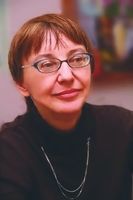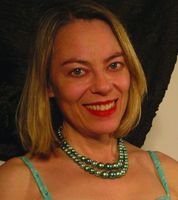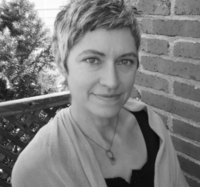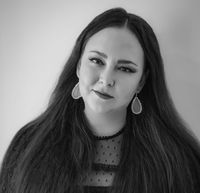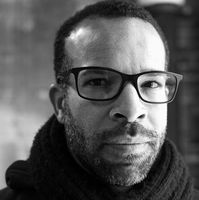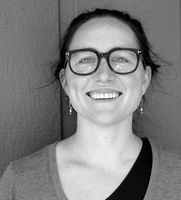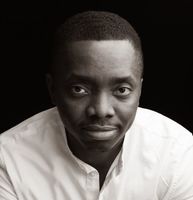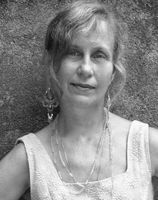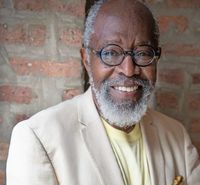"Even Staring Out the Window Has Changed" The 2022 Griffin Prize Poets Speak in Depth on Their Writing Lives
This year, there are ten writers and translators nominated for the Griffin Poetry Prizes. The two prizes—one open to collections authored by Canadian poets and one open to any international collection written in or translated into English—are amongst the most influential and prestigious in the world at this point, and each carries a $65,000 prize for its winner.
The 2022 nominees for the international prize are Ukrainian poet Natalka Bilotserkivets, for Eccentric Days of Hope and Sorrow (Lost Horse Press), along with translator team Ali Kinsella and Dzvinia Orlowsky, Catalan poet Gemma Gorga for Late to the House of Words (Saturnalia Books), along with translator Sharon Dolin, American poet Douglas Kearney for Sho (Wave Books), and fellow American poet Ed Roberson for Asked What Has Changed (Wesleyan University Press).
For the Canadian prize, the nominees are debut poet David Bradford for Dream of No One But Myself (Brick Books), past Griffin Prize winner Liz Howard for Letters in a Bruised Cosmos (McClelland & Stewart), and former doctor and debut poet Tolu Oloruntoba for The Junta of Happenstance (Anstruther Books/Palimpsest Press). Both Bradford and Oloruntoba have previously published acclaimed chapbooks, and Howard's first collection won the 2016 Griffin Poetry Prize (Canada); her nominated collection this year is her second book.
We had the unique opportunity to speak to all ten nominated writers and translators, with the result being an incredible deep dive into the writing and translating process, recurring themes the poets find in their work, and their favourite Canadian poems. This is a true buffet for poetry lovers, with ten of the world's best meditating on their work and writing habits with insight, wisdom, and generosity. Read on to hear from Bilotserkivets on translation, where she calls her translators her "co-authors", from Howard on the complex and personal origin of her spectacular title, from Kinsella on how a song by a popular Ukrainian rock band featured in her translation journey, and much, much more.
The 2022 Griffin Poetry Prizes will be announced tomorrow, June 15, in an online event.
Open Book:
Tell us about your nominated collection and how the project originated for you.
Natalka Bilotserkivets:
The idea for this book belongs to Lost Horse Press, which has been offering Ukrainian poetry to an English-speaking readership for some time now, and two wonderful translators, Ali Kinsella and Dzvinia Orlowsky. It was an email from Ali in early 2020 that introduced me to this comprehensive and ambitious project. I was happy to support it and help bring it to life.
This bilingual book is interesting for poetry lovers who know both languages and can therefore take extra delight in the great art of translation through parallel readings, comparing the possibilities of the languages and relishing the creative discoveries. After all, translators, especially when it comes to poetry, are in fact co-authors. In this case, they are no less poets than the authors of the originals.
There are already quite a few published translations of my works into English (along with over a dozen other languages). Some poems have even been translated multiple times by different translators. Dzvinia, herself a well-known poet, has been translated my work since as far back as the mid-90s, but I was truly moved that she and Ali chose my work for this interesting publishing project.
I know that most readers of Eccentric Days of Hope and Sorrow won’t know Ukrainian (or, for that matter, my name) and will read this book as one is supposed to read poetry for pleasure—in a language they know, looking for images, feelings, and associations with their own life that are important to them personally. I gave my translators carte blanche to choose the poems they were drawn to and compose them how they saw fit, limiting myself to suggestions and comments here and there where necessary. Of course these are my poems and this is my book, but it is no less their book or their poems!
But Ali and Dzvinia can tell you about that themselves!
Your CanLit News
Subscribe to Open Book’s newsletter to get local book events, literary content, writing tips, and more in your inbox
David Bradford:
Dream of No One but Myself originates in an interest in inconvenient family and personal stories, an interest in the felt experience of what they often are—that is, things that can’t be cleaned up, nor learned like lessons, nor fully laid to rest. I was really invested in the idea of the intervening on the trauma book or memoir, in unravelling the promise that such writing about what happened could be a magic solution or the way to finally leave it all behind. So, I set out to go through those motions myself—with my difficult history with my father, with the aftermath of his difficult history with his mother, with my mother and I left holding it all now, and so on—to document undoing the promise for myself. I wanted alternatives to probing for resolution, which is where the multi-formal and auto-erasure gestures central to the book emerged. With those tools, I wanted to think on and move through the experience of how a person can just keep wading through this stuff—the way you get to know that’s true, but the knowledge flakes off and needing to know it can just keep coming for you. I wanted to just really, thoroughly document an experience of that phenomenon, the motions and textures that make it that way, lay out a critical mass of the stories that bring it all to life over and over again. I wanted something that felt exhaustive in those pursuits, so that at least the urge to make work on this stuff might be laid to rest. And it feels like it has.
Sharon Dolin:
I fell in love with the poetry of Gemma Gorga when I read several of her poems in the bilingual poetry anthology Six Catalan Poets, edited by Pere Ballart and translated by Anna Crowe. I was struck by the poems’ modesty and ambition: the way a single poem might move from the domestic to the metaphysical, from narrative to lyric, from brief love letter to prayer to philosophical speculation, always grounded in a preoccupation with language itself. I first translated her prose poem sequence Book of Minutes (Oberlin College Press, 2019), an anomaly in her oeuvre. Then I really wanted to continue translating more of her poetry, the majority of which is written in lines. I began translating her volume Wall (Mur, 2015) but quickly decided that a Selected Poems would work best as an introduction to Gorga’s work for an Anglophone readership. This decision enabled me to choose poems from six volumes of Gemma Gorga’s poetry, spanning the years 1997-2020. The choice is based on my own sense of which poems I felt worked best in English translation.
Gemma Gorga:
The project originated thanks to the enthusiasm of Sharon Dolin, who, after having translated one of my previous works, Book of Minutes (Oberlin College Press, 2019), decided to prepare a representative anthology of my poetry. In a certain way, I could say that this project was “given” to me.
Liz Howard:
My book braids together Anishinaabe sky knowledge, Western cosmology, physics, and neuroscience with personal experience to examine grief, estrangement, violence, survival, and the transformational possibilities of language as art.
Shortly before my first book was published I flew to Halifax to see my birth father who had surfaced there in a hospital. I had never met him before. He left when I was a baby and suffered from alcohol use disorder. He had lived a somewhat peripatetic life, moving from place to place and working odd jobs or living “off his wits,” as I was told, and was therefore untraceable. He passed away shortly after I arrived at the hospital and I stayed for a week to help my aunt with arrangements. During this time, I turned to writing as a way to understand and work through what I was feeling and experiencing. The writing took the form of a letter to a friend and I eventually turned that letter into a poem. I became interested in letters and epistolary forms. Partially in a response to criticism that my first book was inaccessible, I wanted to write in direct address, to write explicitly to others, and to write about my own experiences in a less coded way. I felt that the gravity of what I had lived necessitated this. I was also grappling with a diagnosis of PTSD following an event in which my life was threatened. I became interested in the neuroscience, genetics, and theorization of trauma and this research also entered my writing.
One afternoon I came across a science news article about the ‘cosmic bruise’. A region of space that is hypothesized to be evidence of a collision between our primordial universe and another universe and thus could give weight to the theory of multiple universes. I was so struck by this metaphor of a bruise, of a mark left by contact. I thought that in a way so much of experience is a like a series of collisions that mark us, and have the potential to sustain or transform us, for good or for ill. I gathered that this could be a kind of organizing framework for a book.
After my father died I was able to reconnect with family members and learn our family history, including the location of the reserve my great-grandparents were originally from. Much of my work and healing has come through a process of reconnection and reclaiming what has been lost to racism and pressures of assimilation. I was concerned when working on my first book that I was privileging the Western scientific and philosophical perspectives that I had been trained in. The epistemological and existential anxieties present in that book are rooted in the fact that those frameworks in isolation were inadequate and did not accurately reflect my experience nor who I am and where I come from. I wanted to represent Anishinaabe sky knowledge in this book in addition to Western cosmology not as a counterpart but as a braid along with personal experience as a way to write about survival against the odds.
In 2018 I attended a REDTalk called “Stars and Sky Stories: Indigenous Cosmology and Western Astronomy” and through this talk I learned about the constellation Bagone’giizhig, or ‘the-hole-in-the-sky,’ which corresponds to the Pleiades. It is seen as a portal between this world and spirit, where we go when we dream or pass on, and possibly as the hole Sky Woman fell through to become part of the creation of Turtle Island. Both the ‘cosmic bruise’ and Bagone’giizhig call to mind for me the liberatory phrase “another world is possible.” The book was written towards that possibility.
Douglas Kearney:
I hadn’t planned on Sho: I was working on a manuscript called Actors, Not Real People, but when I took a step back, I realized that I had lost interest in what that manuscript would be—not to mention, I was still several poems from being done with it. But in looking for poems that would complete Actors…, I found several poems and drafts that looked like they could work well together. These became Sho.
Further, I wanted to see what it would feel like to put out a collection with poems all composed in a word processing program (as opposed to the page layout software I often use) and fewer poetic series. This made it a hard turn from Buck Studies, my previous collection.
The open-field approach that characterized many of the poems in Buck Studies (where lines careened, overlapped, and collided) has helped me to develop an in-line syntactic approach that animates the prosody and thinking in several of the poems herein. Eschewing series has meant that where I usually had multiple parts via which to refract and reframe a theme, I’m compressing that process in conjunction with the syntax.
Put another way: I’m seeing what it’s like to hit crooked licks with straight-seeming sticks.
Ali Kinsella:
I love this question because I think Dzvinia and I have a cute “origin story.” The Ukrainian translation community is fairly small, so I had known about the Contemporary Ukrainian Poetry Series at Lost Horse Press and series editor, Grace Mahoney, for a while before I started working with Dzvinia. I had been wanting to get involved and was considering a list of some of Ukraine’s best female poets, but I kept coming back to Natalka, whose work, I must admit, I was only somewhat familiar with. But she has this perfect poem that was set to music by one of the first Ukrainian rock bands, Mertvyi piven (Dead Rooster), and I just loved it. Grace suggested I get in touch with Dzvinia, a Ukrainian-American poet who was looking to collaborate on a volume for the series, and I found her through her personal website. I had no idea at the time that Dzvinia was the translator of the definitive English version of that perfect poem, “We’ll Not Die in Paris.” So Natalka brought me and Dzvinia together, but it’s also fair to say that Dzvinia brought me and Natalka together first.
Tolu Oloruntoba:
It originated as most of my projects do, in increments. To use an example from the 3-act dramatic structure, the book I had been writing previously was an “Act 1” book, in this case a coming-of-age story, a Setup. But, as tends to happen, I continued to write poems as I moved into a more difficult phase of my life that involved migration to two countries, graduate school, parenting and family life, corporate servitude, political turmoil in a Trumpian world, and mental illness. I was therefore now writing “Act 2” poems. I was at a Confrontation. I was facing Obstacles. Because the newer poems felt more vital and urgent, I began to move the older poems into my scrap folder. The eventual manuscript contained none of the poems I had written in the almost 15 years before 2017. From that point, the manuscript continued to become more cohesive, and a truer record of my state of mind between 2017 and 2019.
Dzvinia Orlowsky:
Eccentric Days of Hope and Sorrow brings together a selection of Natalka Bilotserkivets’ poetry written over the past four decades. Bilotserkivets was an active participant in Ukraine’s Renaissance of the late-Soviet and early independence period, and her lyricism and quiet power of despair became a hallmark of Ukraine’s literary life in the 1980s and 90s. However, except for a small number of widely anthologized poems—"We’ll Not Die in Paris,” her most well-known poem—the larger body of work remains relatively unknown to English language readers. With the support of Lost Horse Press, my co-translator, Ali Kinsella, and I were determined to change that.
I fell in love with Natalka’s poetry back in 1995 when the late Ed Hogan, Founding Editor of Zephyr Press, invited me to translate several of her poems for the press’s seminal anthology, From Three Worlds: New Writing from Ukraine. At that time, I was mostly familiar with epic or nationalistic narrative poems or short verse relying heavily on sentiment and rhyme. Natalka’s evocative lyricism resonated deeply within me. After the anthology’s publication, she and I stayed in touch and I continued to translate several of her poems, mostly for Ukrainian-published anthologies as well as for the Poetry International Rotterdam Festival. In 2020, Grace Mahoney, Lost Horse Press Contemporary Ukrainian Poetry Series editor, introduced me to Ali who was looking for a poet to co-translate a book-length selection of Natalka’s poetry with her. Our strengths complemented each other.
Bilotserkivets is a poet of witness. She writes of despair but also desire. The poems included in Eccentric Days of Hope and Sorrow explore that duality and range—from daily, family-oriented life affirmations to survivorship of national tragedies.
Ed Roberson:
A West Coast editor solicited poems for an anthology focusing on climate change and other ecological issues. In the solicitation letter, he listed a series of questions that he would like the poems to address. I read the first question and burst out laughing. It was something like, “In light of recent ecological and climate disasters, what has changed in your writing, your practice, etc.?”
“Well, everything,” I thought. “Even staring out the window has changed.” And I went on from there.
I had been working with a few writing friends on poems in response to an exhibition of William Blake’s engravings at Northwestern University’s Block Museum of Art. The university had brought the engravings there in celebration of its Shakespeare Garden, landscaped on campus for 100 years. My straw pulled Blake’s “Tyger, Tyger.” I turned his “who, what” question into a real estate query that indicted the destruction of the planet. That poem, “Speculation,” and other exercises we did seemed right on track, so I continued to compile the book that became Asked What Has Changed.
Open Book:
Are there images, themes, or questions you notice recurring in your work? If so, what are they?
Bilotserkivets:
Well, Eccentric Days brings together poems from different periods of my life that don’t have a thematic or formal through line. The music of a poem has always been important to me. I always recite my lines out loud to myself before committing them to paper (I still can’t imagine how you can create poetry on a computer—or for that matter, on a typewriter). But this music isn’t a template; it’s as varied as free verse or “classic” rhymed and metered verse, or even the lyrics to a song.
It’s the same for me with themes or leitmotifs in poetry. Perhaps the main theme (if one can be identified) in my work is the theme of youth and longing for it. Connected to the theme of youth are the images of love and death. Some of my favourite images are trains and stations, meetings and farewells. Freud, in his The Interpretation of Dreams, said trains were the image of death. Perhaps if he were interpreting dreams today, he would say planes are. For me, hotels are also a symbol of human loneliness and restlessness, especially those bare-bones ones that are called Hotel Central all across Central Europe.
In theory, any image from life can become a symbol. Say, the rose, which I happen to have a poem about. Or swallows, which I’ve also written about and which appears in this volume. But what’s really interesting, is that over the years (and I’ve been writing poems for over half a century) a single poem, a single image or history (along with music, this is another mandatory element of poetry) can start to sound completely different. I have suddenly noticed this over the last three months of war in Ukraine, especially since I haven’t been able to write “new” poems these days. To rephrase Adorno’s well-known claim about poetry after Auschwitz, perhaps poems won’t be written “after Bucha,” either. Their time will come later.
Bradford:
I think I get really stuck on what you might call “dominant narratives,” and wanting to undo those. This narrative of release in writing the trauma out, for instance, was something I wanted to describe and complicate in Dream of. Similarly with my forthcoming second book, Bottom Rail on Top, I got interested in intervening on the relationship between certain dominant narratologies of Black emancipation in the US and contemporary conceptions of Blackness. There’s some stuff in my next couple of projects that very similarly is after some story that’s centred over and over again that I’d like to poke holes in. I think I’m always looking for impasses to illuminate, pick at and break out of.
Dolin:
In the work of Gemma Gorga as well as in my own poetry, there is a persistent preoccupation with, and delight in, language itself: What are its limits? What can and cannot be said? How can white space be used to frame the sayable and the unsaid—to gesture toward the silence? There is often a preoccupation with the metaphysical within the physical world in Gorga’s poetry. Moreover, Gorga will often deploy scientific diction in order to describe intangible states of being. In a number of her poems, there is a movement from vision to the visionary. Finally, in my own and in Gorga’s work, there is a movement toward the salvific quality of language itself, toward the “word,” “toward some living syllable,” as she writes in “Mirror, Mirror on the Wall,” if only it can be found.
Gorga:
Despite I try to do something new and unknown to me in every new book, I inevitably end up circling around some motives, images, and obsessions that nurture my person and my work. Now, with the perspective of seven books published, I look back and clearly see some of these recurring themes. One of the most noticeable is the reflection on words, language, etymology, and dictionaries (maybe because Catalan has been forbidden many times along history, and this makes me more aware of the depths that a language treasures). Another of my favourite themes is the elusiveness of reality. In order to dig into this matter, I try to pay attention to the smallest, tiniest, quietest realities: it can be an object, but it can also be a thought, an elusive feeling, a humble word not noticed before. Poetry gives back dignity to every single thing.
Howard:
Holes, portals, marks, history as a sewing motion, how to survive, how to determine truth and authenticity, complex systems, rivers, consciousness, anatomy, dreams, and desire.
Kearney:
I frequently engage the crossing of entertainment and violence. My friend, the amazing poet, LaTasha N. Nevada Diggs once challenged me not to put any references to minstrelsy in a collection. Maybe I didn’t? Blood and teeth feature pretty regularly (which of course is a visual slant rhyme for a blackface minstrel’s mouth). I often find myself trying to limit the number of images I engage, typically favouring that the reader’s attention is on the letterforms themselves more than to that which the letterforms spell out as signifiers. This isn’t programmatic, but it influences my compositional decisions pretty keenly.
Kinsella:
As a translator, I don’t really get to pick the themes of my work. Obviously I try to only translate pieces that I like and that speak to me (the economic reality of translating from a “small” language like Ukrainian means I can’t only take on projects I absolutely love), but it’s not my place to insert a theme where it doesn’t already exist. In fact, I don’t know if “theme” is the right word to describe what draws me to an author or a piece.
It might be fair to say that translation is very personal for me and that when I like a writer personally (obviously I don’t know everyone I translate, but these impressions are usually made quickly, and not always on the basis of a work, per se), it is easy for me to find aspects of their work that I like.
I’m struggling to express myself—maybe if someone could write it first in another language! I think the heart of the matter is that as a translator, my intent is less to grapple directly with an idea or theme, than to offer others’ grapplings to the world. So whenever I come across someone who asks questions or is critical in a way that I like, I feel the urge to make sure others can read her, too. Once I see that someone has something worthwhile to say, I’m pulled in deeper, encouraged to find the worthwhile in all their other works. With poetry, I might not feel equally enthusiastic about every poem, but I am willing to grant that that worthwhile nugget might be in there. In this sense, I trust my authors. And I’ve usually found they trust me to coax their texts into English. These two types of trust are different in kind, but not in degree. This was certainly the case with Natalka.
Oloruntoba:
I write only four poems, over and over forever (sometimes in combination):
- Is this society broken, and the things we need to do to survive within it untenable, or am I the weird one?
- Some families are dysfunctional
- Some brains are sickly
- Empires are bad
Orlowsky:
Yes, over the course of writing my books, I’ve explored the evolution of “self’ and “voice” through the following images, themes, and questions:
A Handful of Bees(Carnegie Mellon University Press, 1994)
The legacy of displacement. My father’s death at age 64 from cancer ruptures my Catholic faith and “magical thinking” that, having survived WWII, my family was now safe from all harm. As a first-generation daughter of Ukrainian immigrants, my newly acquired hyphenated designation, “Ukrainian-American,” raised the question: does the “hyphen” provide enough of a bridge between two very distinct cultures?
Edge of House(CMUP, 1999)
Motherhood. My home and family are my country. Life is constituted by a variety of boundaries. Life is transgressing or respecting these boundaries.
Except for One Obscene Brushstroke(CMUP, 2003)
The body as a pleasure-seeking country. Embracing taboo subject matter: the body desirous—equally beautiful and vulgar.
Convertible Night, Flurry of Stones(CMUP, 2008)
The body as potentially lethal country. Journey through diagnosis and treatment of breast cancer. Father’s death and my Catholic faith are revisited.
Silvertone (CMUP, 2013)
My father’s acoustic guitar as a potent family icon. What I inherited/what we inherit: objects that embody and preserve cultural identities. What is the legacy of the family and the tribe?
Bad Harvest(CMUP 2018)
Stalin’s hunger famine of 1930-1933 (“Holodomor”), nightmares of Eastern Europe in the twentieth century. Cultural collective, familial, personal memory as narrative triggering points. Even after a bad harvest, there must be a sowing – Seneca the Younger.
Roberson:
What is real? My favorite. It shows up as “What am I seeing” in a lot of poems. It appears in poems such as “Luxe,” asked from a nonhuman perspective.
Open Book:
Tell us what a typical writing day (if such a thing exists for you) looks like while you're working on a collection.
Bilotserkivets:
I’m not sure the concept of a “working day” or “working hours” applies to the creation of poetry. More than other literary genres, poetry depends on so-called inspiration, or perhaps it’s enlightenment, which is more of a natural phenomenon than work. (At least, it’s better not to apply that famous Latin expression—“Nulla dies sine linea,” or “no day without a line”—to poetry.) So “creative work” can actually happen at any time in any place, whenever you happen to observe something, think something—whenever you’re just living. Any detail from life, any experience can become a poem.
Of course there are moments of working on a book, which could be considered more traditional “working hours.” For example, when you’re reading proofs or making edits. Although maybe that is also related to creativity… no, my translators can probably speak to this better!
Bradford:
I think the idea of getting back to a typical writing day is pretty dreamy to me right now. I’m working on that. For the last long while, I’ve taken to waking up around 6, out of bed by 7, working on something by 7:30, usually through to at least 9. Like most people, lots of other work (good, annoying, pointless) gets in the way, so I try to make a point of spending the first couple of hours of the day on some creative priority, whether that’s writing or translating or reading, depending on where I’m at with all that, before I get to the other stuff. I’ve recently begun scaling back some of the other work to make a bit more space for these priorities, so I’m hoping over the next while I can focus on writing, translation and reading till lunch comes around. I don’t know how to work on writing in the afternoons at this juncture—unless I’m at the revising stage in a project, in which case I’ll probably go all day, sometimes all evening too—so my afternoons are usually errands, correspondence, the most pointless works, coffee with folx, and working out.
Dolin:
While I’m working on a collection, be it a book of translation or my own poetry, I don’t have a typical day. I just try to write/translate for several hours every day.
Gogra:
Since I don’t earn a living with poetry, it doesn’t exist such a thing as a “typical writing day”. Although we can turn the question upside down: every single moment, if lived with full attention, can be a writing moment. I’m not saying that this is something that easily happens. I’d rather see it as a horizon, an encouraging possibility.
Howard:
A typical day might involve a lot of “free writing” in a journal. I also write about what I am reading and researching and also my dreams and daily life. “Editing” or “craft” should probably enter earlier into the process than it usually does but this method seems to “work.”
Kearney:
When I’m really into a collection, I tend to write late at night when my family is asleep. I’m usually revising at that point—working on individual poems or building connections to the other poems in the collection. The two main processes for my revision (speaking generally) are “tuning” and “distressing.” Tuning is when I am focused most closely on sound, making decisions about word choice that will create the most chimes sonically. Distressing takes tuning in hand but seeks to amplify sound as sense through re-examining syntactic possibilities, turning and twisting the sentences, lines, and phrases into a kind of abstracted flow that reads, I’d like to think, as something neither recognizably formal nor authentically vernacular, yet informed by the textures each suggests. I’m laughing at even saying “each”—within “formal” and “vernacular” there is so much multiplicity. Let’s say I’m going towards a syntax that signifies (on/with) those vast categories. I say “distressing” in relation to the more common metaphor for revision: “polishing.”
Kinsella:
I don’t think there is such a thing for me. Dzvinia and I translated the bulk of this collection under “high quarantine.” I was rarely leaving the house, except perhaps to go on my daily walk or fraught, fortnightly trip to the grocery store. I have a distinct memory of sitting on the floor in my kitchen going over edits with Dzvinia on the phone—I guess I was looking for variety. Between starting our project and its actually being published, I got pregnant and had a baby, so my “writing days” look very different now. My partner and I both work part-time from home so that we can take care of our child jointly. Still, it is nearly impossible to string together even a couple of productive hours. I find myself working in spurts, trying to maintain my train of thought from one to the next. Dzvinia and I have recently signed on to translate another collection for Lost Horse Press’s series, this one by Halyna Kruk from Lviv. I know for a fact I won’t have the double luxury of having no child and nowhere to go that I had when working on Natalka, but Dzvinia and I have also gotten used to each other’s rhythms and can anticipate choices, meaning we work a lot faster. I hope this serves us!
Oloruntoba:
I don’t have a typical writing day, but when I am working on a collection and the momentum is with me, I arrange my writing time around my work day. I wake up as early as I can and write / edit before the kids wake up. If I'm commuting, I may scribble on the bus. I am usually reading a lot while writing, so I take breaks while I am in transit if whatever I am reading propels my own thoughts. If I have enough energy or wakefulness at the end of the day, I putter around in my drafts for a while until I go to bed. I must point out that these writing periods constitute less than 10% of my year.
Orlowsky:
Between 1994 and 2018, I published eight full-length collections: six in poetry; two translations. Back then, a typical schedule for me allowed for roughly two-three hours a day of writing, at no specific time of day. Stolen hours when the kids were away for a sleepover or days free of grading papers gave me more time.
In 2020, with the global COVID-19 pandemic forcing everyone into quarantine, I came closest to what I would describe as the ideal structured writing day. This consisted of four to five hours of daily writing: ideally an hour in the morning, two in the afternoon, and two in the evening, usually reserved for revising. It was during this time that I began working on Eccentric Days of Hope and Sorrow. Translation is addicting, rewarding work.Two hours often spilled over into four hours at the laptop without a break.
Roberson:
There is no typical writing day for me. I write whenever an idea or phrase comes. I write on anything: newspaper or magazine blank spaces, the tear-off section of bills and renewal forms, packaging—anything. I write with anything—ink, pencil—and only later put the writing into the computer. I continue refining the compositions for rhythmical timing (by line and by spacing, open and vertical), for graphic image and form (by line count, repetition, and stanzaic structure), and for music (by reading aloud). Then a final typed copy is made, saving all the revisions. This can take a day or several weeks. I work on several ideas/poems simultaneously. A writing life is more comprehensible to me than a writing day.
Open Book:
If you were to recommend just one Canadian poem (or poetry collection) to readers right now, what would it be and why?
Bilotserkivets:
Unfortunately, I am not well acquainted with the poetry of Canada. Undoubtedly the Canadian poets could better answer this question. I am actually more familiar with your prose, thanks first and foremost to two wonderful writers, Alice Munro and Margaret Atwood. And if I were recommending Canadian poetry to myself, I would make myself to finally find one of Atwood’s collections! Not many people in Ukraine know her poetry, which I don’t think has been translated. I wonder which of her works she would recommend to me :)
Bradford:
Oh, that’s so hard lol. One in particular comes to mind that I’m trying to resist, but here it is anyway: “Wolf Town” by Anne Carson. I hadn’t read Nox yet when I was laying out Dream of (thank god), but I did come across this poem from Plainwater. Reading it those first times, something clicked on in my brain, something related to the odd drama of her poem’s intentionally misplaced periods, that gave me a few ideas for what would become my own odd use of periods in Dream of. It’s a really, really brilliant little bit of craft, and a vicious little gem. You can google around and find it, so do.
Dolin:
I am very intrigued by the poem “Settler—Anishinaabekwe—Noli Turbare” by Liz Howard from her book Letters in a Bruised Cosmos for the way it seeks to make sense of this current moment by positioning the speaker in various geographies as a way to “circumvent / the disaster.”
Gorga:
I’m sorry, I don’t have easy access to Canadian literature, so I can’t answer this question.
Howard:
19 by Brandi Bird is a poem that I teach often for its captivating imagery, sense of place, voice, and use of embodiment. I find the metaphor of “I am still/too heavy for the wind to take me/anywhere fast. I am still too much.” as particularly powerful because it can speak to the idea that the heaviness we carry, or the “too much” of full expression, can also be protective or even a site of resistant presence.
Kearney:
A collection I would recommend: M. Nourbese Philip’s Zong! It’s a haunted documentary of the slaveship Zong and a harrowing act of channeling. When you see the pages, you are witnessing language being broken apart and coming into being across the breadth of the folio. The type seems to gasp for breath. It’s monumental.
Bonus: I’m excited that Kaie Kellough was honored with a Griffin a couple of years ago. Kellough gifted me some years ago with Maple Leaf Rag. Get that, too!
Kinsella:
Oy, I feel painfully underqualified to answer this question. I have to admit that I am a translator of prose only masquerading as a translator of poetry. I have been a big fan of Anne Carson’s ever since my younger brother introduced me to her—clearly I’m drawn the prose and narrative qualities of her poetry. I have even translated (poorly, no doubt!) her “The Glass Essay” into Ukrainian. I don’t know if her work is particularly apt right now, but I do believe a poet speaking truthfully to the human condition can serve us at any time.
Oloruntoba:
The poem that immediately comes to mind is Aidan Chafe’s haunting poem “Safety Rules,” from his second collection, Gospel Drunk (which I feel has not received the attention it deserves). I found a Google Books excerpt here. I won’t spoil the poem for those who have not read it, but it begins thus: “Treat every man as if he could be loaded. Always keep a man unloaded until you are ready to use him.” I think that poem, as an archetype of the collection, takes toxic masculinity to necessary account in a way that is humorous, unflinching, and resourceful. This poem wields the kind of satire I see too infrequently in poetry. But when deployed as effectively as Chafe does it, it leaves an indelible impression. It is a poem that speaks to the circular moment we are in, locked as we are in a perennial debate about firearms while the usually explosive men that carry them continue to damage entire countries with them.
Orlowsky:
Taking a risk here, I would recommend “Bread” by Margaret Atwood. Regarded more commonly as flash fiction, it is, to my mind, a powerful sequential prose poem. There is story and structure, but its persuasive anaphora, “Imagine…” followed by image-driven intensity: Imagine a piece of bread which you cut yourself a slice (language play!) followed by Imagine a famine… the streets are infested with scavengers and the stink of corpses is everywhere pull heavily on emotions as it shapes its own subversive narrative. Its accented musicality further reinforces an affinity with prose poetry. I return to it because, in addition to its poignant lyricism, it’s timeless and offers multiple interpretations. I read it through the lens of the current war in Ukraine and value its commentary on all global injustices, atrocities, and suffering.
Roberson:
I would recommend the work of M. NourbeSe Philip, Adam Dickinson, and Suzanne Buffam.
_________________________________________________
Visit the Griffin Poetry Prize website to learn more
Natalka Bilotserkivets has published five volumes of poetry. Her work, known for lyricism and the quiet power of despair, became a hallmark of Ukraine’s literary life of the 1980s and 1990s. The collections Allergy and Central Hotel were Books of the Year in 2000 and 2004, respectively. Still, the majority of her oeuvre remains unknown in the West. She lives and works in Kyiv.
David Bradford is a poet and editor based in Tioh’tia:ke (Montréal). He holds a BA from Concordia University and an MFA from the University of Guelph. A lifelong Montrealer, Bradford’s work formally engages and frustrates dominant conceptions of Blackness in the Diaspora. His poetry has appeared in, among others, Prairie Fire, The Fiddlehead, filling Station, The Capilano Review, Carte Blanche, and anthologized in The Unpublished City, a 2018 Toronto Book Awards finalist. He is the author of several chapbooks, including Call Out (2017), Nell Zink Is Damn Free (2017), and The Plot (2018). Bradford’s first book, Dream of No One but Myself, is an interdisciplinary inquiry into the versioning aspects of his and his family’s histories with abuse and trauma.
Sharon Dolin is the author of six books of poetry, most recently Manual for Living (2016), Whirlwind (2012), and Burn and Dodge (2008), which won the AWP Donald Hall Prize for Poetry. She is also the author of a book of translations, Gemma Gorga’s Book of Minutes (2019), and a prose memoir, Hitchcock Blonde (2020). The recipient of a 2021 NEA Fellowship in Translation, she lives in New York City, where she is Associate Editor of Barrow Street Press and directs Writing About Art in Barcelona.
Gemma Gorga was born in Barcelona in 1968. She has a PhD in Philology from the University of Barcelona, where she is Professor of Medieval and Renaissance Spanish Literature. She has published seven collections of poetry in Catalan: Ocellania (1977), El desordre de les mans (2003), Instruments òptics (2005), Llibre dels minuts (2006) which won the 2006 Premi Miquel de Palol, Diafragma (2012), Mur (2015); and Viatge al centre (2020). She is also the author of a prose journal of her time spent in India entitled Indi visible (2018).
Liz Howard’s debut collection Infinite Citizen of the Shaking Tent won the 2016 Griffin Poetry Prize, was shortlisted for the 2015 Governor General’s Award for poetry, and was named a Globe and Mail top 100 book. A National Magazine Award finalist, her recent work has appeared in Canadian Literature, Literary Review of Canada, Room Magazine and Best Canadian Poetry 2021. Her second collection, Letters in a Bruised Cosmos, was published by McClelland & Stewart in June 2021. Howard received an Honours Bachelor of Science with High Distinction from the University of Toronto, and an MFA in Creative Writing from the University of Guelph. She has completed creative writing and Indigenous arts residencies at McGill University, University of Calgary, UBC Okanagan, Douglas College, Sheridan College, and The Capilano Review. She is also an adjunct professor and lecturer in the Department of English at the University of Toronto and serves on the editorial board for Buckrider Books, an imprint of Wolsak & Wynn. She is of mixed settler and Anishinaabe heritage. Born and raised on Treaty 9 territory in Northern Ontario, she currently lives in Toronto.
Douglas Kearney has published seven books, most recently Sho (2021), a National Book Award, Pen American, and Minnesota Book Award finalist. Buck Studies (2016) was the winner of the Theodore Roethke Memorial Poetry Award, the CLMP Firecracker Award for Poetry, and silver medalist for the California Book Award (Poetry). Kearney’s collection of writing on poetics and performativity, Mess and Mess and (2015), was a Small Press Distribution Handpicked Selection, and Starts Spinning (2019), a chapbook of poetry. His work is widely anthologized, and he is published widely in magazines and journals. Kearney teaches Creative Writing at the University of Minnesota-Twin Cities where he is a McKnight Presidential Fellow. Born in Brooklyn, raised in Altadena, CA, he lives with his family in St. Paul, MN.
Ali Kinsella has been translating from Ukrainian for nine years. Her published works include essays, poetry, monographs, and subtitles to various films. With Ostap Kin she translated Vasyl Lozynsky’s chapbook The Maidan After Hours (2017). She won the 2019 Kovaliv Fund Prize for her translation of Taras Prokhasko’s Anna’s Other Days. She holds an MA in Slavic studies from Columbia University, where she focused on Eastern European history and literature. A former Peace Corps volunteer, Ali lived in both Western and Central Ukraine for nearly five years. She now lives in Chicago, where she also sometimes works as a baker.
Tolu Oloruntoba is the author of chapbook Manubrium, shortlisted for the 2020 bpNichol Chapbook Award His poetry has appeared or is forthcoming in Harvard Divinity Bulletin, PRISM International, Columbia Journal, Obsidian, and Canadian Literature, and has been nominated for the Pushcart Prize. His short fiction has appeared in translation in Dansk PEN Magazine. He practiced medicine before his current work managing projects for health authorities in British Columbia After a somewhat itinerant life in Nigeria and the United States, he emigrated to the Greater Vancouver Area, where he lives with his family in the territories of the Semiahmoo, Katzie, and Kwantlen First Nations.
Dzvinia Orlowsky is the author of six poetry collections, including Bad Harvest (2019), a Massachusetts Book Awards ‘Must Read’ in Poetry. She is a recipient of a Massachusetts Cultural Council Poetry Grant, a Sheila Motton Book Award, and a co-recipient of a 2016 National Endowment for the Arts Literature Translation Fellowship. She is a contributing poetry editor to Solstice Literary Magazine and founder of Night Riffs: A Solstice Magazine Readings & Music Series. She teaches poetry and creative writing at Providence College, and is a Writer-in-Residence at the Solstice Low-Residency MFA in Creative Writing Program.
Ed Roberson, born and raised in Pittsburgh, Pennsylvania, is a contemporary poet interested in the environment, visuality, and spirituality. He is the author of numerous collections of poetry, including MPH + Other Road Poems (2021), the chapbook Closest Pronunciation (2013), To See the Earth Before the End of the World (2010), which was a runner up for the Los Angeles Times Poetry Award, The New Wing of the Labyrinth (2009), City Eclogue (2006), and Atmosphere Conditions (1999), which was chosen for the National Poetry Series, and was a finalist for the Lenore Marshall Poetry Prize. He lives in Chicago, where he has taught at the University of Chicago, Columbia College, and Northwestern University.

